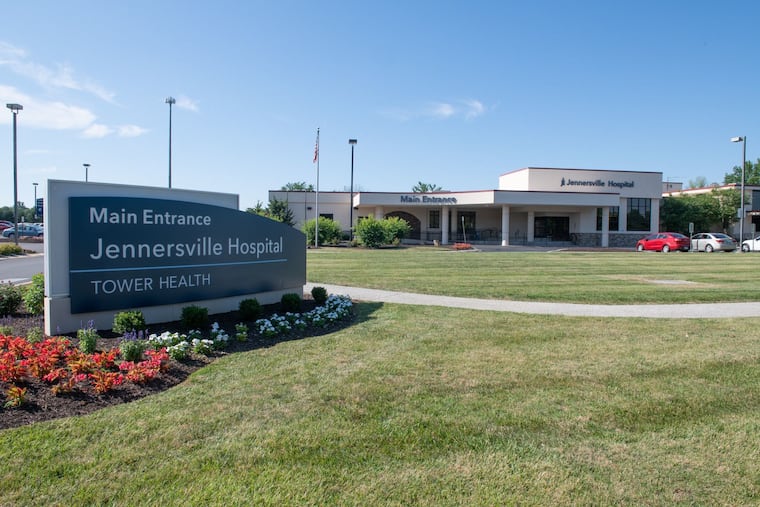Can the new owner of Jennersville and Brandywine hospitals save those facilities?
Jennersville is known for its ER while Brandywine runs a key inpatient psychiatric service. But both are small and losing money. And little is known about the proposed buyer, Texas-based Canyon Atlantic Partners LLC.

Chester County officials were thrilled when Tower Health announced on Nov. 22 that Jennersville Hospital would remain open under a new owner, instead of closing on Jan. 1.
But questions remain about whether the proposed buyer, Texas-based Canyon Atlantic Partners LLC — which has also agreed to buy Brandywine Hospital — can succeed in making the facilities financially sustainable.
“Both hospitals have been challenged for a long time,” said Dan Grauman, chief executive of Veralon, a Philadelphia health-care consulting firm. “In general, it’s very difficult to successfully manage, operate, and balance the books for very small community hospitals. New ownership or management doesn’t change that fact.”
Tower’s most recent results, for the three months ended Sept. 30, show Brandywine with a $5.2 million loss on $21.5 million in revenue and Jennersville with a $2.9 million operating loss on $9.3 million in revenue. The whole Tower system had a $16.8 million operating loss.
Employment at the two hospitals has fallen 20% from a combined 1,018 workers a year ago to 810 recently.
The price for the two hospitals has not been disclosed. Tower acquired them in 2017 as part of a $423 million deal for five small hospitals and have had huge losses since.
» READ MORE: The futures of Brandywine and Jennersville Hospitals have worried Chester County officials for more than a year.
David Kreye, Canyon’s chief executive, and Michael Zwetschkenbaum, the company’s chief financial officer, did not respond to requests for comment about their plans for the hospitals or their track records in turning around financially troubled hospitals.
Who are those guys?
Public officials enthusiastically greeted the news of the deal, after the hospitals were on sale for a year, with Jennersville in West Grove finally slated to close Jan. 1.
“If the hospital had closed, the closest ER to nearby residents would be 40 minutes away. That’s unacceptable,” Marian Moskowitz, chair of the county’s board of commissioners said on Facebook.
.
The other facility, Brandywine near Coatesville, is a major Chester County site for inpatient psychiatric care.
But little is known about the hospitals’ new owner, Canyon Atlantic.
David McKeighan, executive director of the Chester County Medical Society, said he and others in the group, which advocated to keep the hospitals open, are scheduled to meet with Canyon leadership on Jan. 4 and are looking forward to learning about the company.
Kreye, the CEO, has the most visible track record, according to news reports, having hopped from one hospital CEO job to the next during the last 15 years or so while working for a series of for-profit community hospital companies.
His career included a stop in Waynesboro, Pa., south of Chambersburg, where he was CEO of Southwest Regional Health Center.
Kreye next turned up in Naples, Fla., as CEO of Physicians Regional at Collier Boulevard. He told the Naples Daily News in 2008 that he was ready to put down roots. In 2010 he showed up briefly as CEO of Ottumwa Regional Health Center in Ottumwa, Iowa.
Investors building Lakeway Regional Medical Center, a new hospital near Austin, Texas, hired Kreye as the inaugural CEO in 2011, the year before it opened.
Not long after, in 2013, Lakeway defaulted on a $167 million mortgage guaranteed by the U.S. Department of Housing and Urban Development. Last year the hospitals’ backers were found to have fraudulently obtained the guarantee and misused loan funds and agreed to repay $15 million, the U.S. Department of Justice said.
Kreye was not named in the federal lawsuit against Lakeway, which is now part of Baylor Scott & White Health.
In January 2014, Kreye became CEO of University General Hospital, a small facility in Houston, Texas, according to a Securities and Exchange Commission filing. That hospital went into bankruptcy in 2015.
Kreye’s LinkedIn profile does not mention University General. Instead, it says that from 2014 to 2017 Kreye was senior vice president for operations at Nobilis Health Corp., a publicly traded company that was buying up surgery centers. It filed for bankruptcy liquidation in 2019.
Public records show that Kreye formed Canyon Atlantic in 2017.
Optimistic timeline
Tower said it expected to complete the sale of Brandywine and Jennersville to Canyon on Jan. 1.
That’s an optimistic timetable, considering that the deal must pass through the Pennsylvania Department of Health for licensing and the Office of Attorney General and Orphans’ Court for the transfer of nonprofit assets to a for-profit company.
The state health department did not respond Friday to a question about whether it has received licensing applications. A spokesperson for Attorney General Josh Shapiro said the office is aware of the urgency and will work to complete its review as “expeditiously as possible.”
» READ MORE: Tower Health's plan to go big went badly awry.
Tower said it “has taken the necessary steps to proceed with this transaction and will continue to cooperate with all relevant authorities and parties.”
Getting the sale done as quickly as possible is crucial to Tower because it wants to eliminate the steady losses from those two hospitals. They contributed to a $96 million drop in Tower’s cash reserves over the summer.
Operating cash is a standard way to evaluate hospitals’ fiscal health. Excluding $118.5 million in Medicare cash advances it must repay, Tower on Sept. 30 had enough cash to keep operating for 77 days if it took in no more money.
That figure is down from 348 days on June 30, 2017, a few months before it undertook that massive expansion that landed it in its current state of financial turmoil.